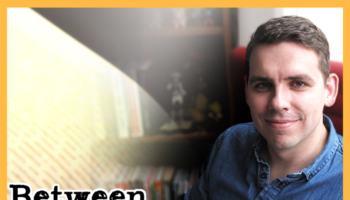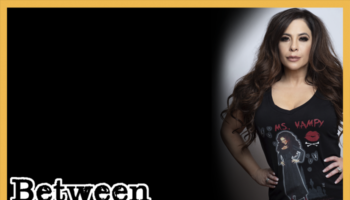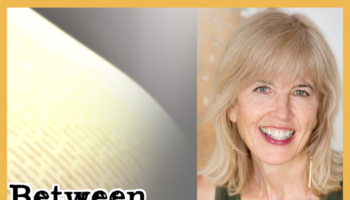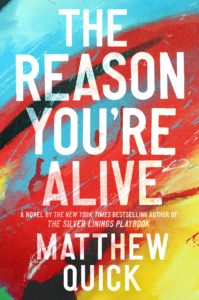 In our new feature, Between the Sheets, TrunkSpace picks the imaginative brains of authors to break down what it takes to create the various worlds and characters they breathe life into via the tools of their trade… sheets of paper. While technology continues to advance and change the pop culture landscape, the written word has remained one of the most consistent and imaginative art forms.
In our new feature, Between the Sheets, TrunkSpace picks the imaginative brains of authors to break down what it takes to create the various worlds and characters they breathe life into via the tools of their trade… sheets of paper. While technology continues to advance and change the pop culture landscape, the written word has remained one of the most consistent and imaginative art forms.
This time out we’re chatting with “The Silver Linings Playbook” author Matthew Quick to discuss his new novel “The Reason You’re Alive,” how writing helps him get to the truth of the matter, and where he’s hardest on himself as a writer.
TrunkSpace: Your new book “The Reason You’re Alive” reached the public on July 4th. In a way, does it feel like the entirety of the United States celebrated its release with fireworks and parties?
Quick: Um.
TrunkSpace: In all seriousness, the book deals in some heavy subject matter, which is an area you never shy away from in your writing. For a lot of people, reading about serious human conflict, either internal or external, helps them get through their own life moments. As the person penning the work, does writing ever open that door for you? Can working through things by way of a character inadvertently serve as an unintended form of therapy for the author?
Quick: Tricky territory here. Writing is a highly personal experience. Every novelist has his or her own reasons for writing. My writing journey was definitely born out of mental health struggles. Mostly anxiety and depression. I often say fiction writing is where I take all the chaos in my mind and chest and attempt to make order on the page. I didn’t realize what I was doing when I first started writing fiction as a teenager. I also didn’t know the wild feeling in my chest was anxiety, but writing made it temporarily go away. When I used to teach I’d tell my students we read novels to make us more empathetic, and I think that’s true. We can always be more understanding toward ourselves.
TrunkSpace: On the opposite side of that coin, can spending time in another person’s darkness, even a fictional person, make it difficult to stay in your own nonfictional light?
Quick: I’m a pretty big believer in the truth setting us free. And fiction writing, for me, is always an attempt to get to the truth of something or someone. The only time I get dark is when I’m creatively blocked. That happens when I am trying to force a lie into my work or life.
TrunkSpace: Something that you do so well is blend humor into the world of your characters, which in a lot of ways, strikes a beautiful balance with the aforementioned heavy subject matter. Is that a conscious focus of your writing or is that relatable funny something that just comes natural to you and in turn is reflected in your characters?
Quick: It’s a coping mechanism that I employ in real life as well. I don’t like tension. I’m an INFJ. I’m a highly sensitive person. An empath. I learned at a young age that making people laugh changes the energy they put out. Lightens things. I wouldn’t say I consciously try to be funny in my novels. But when I am laughing while writing, that’s almost always a sign that the writing is going well.
TrunkSpace: How much did the current state of polarization here in the United States influence “The Reason You’re Alive” and did working on the novel give you any insight into the divisive mindset of the nation as it stands today?
Quick: I finished writing the novel well before the last presidential election began to heat up. I was raised by extremely conservative Republican Christians and educated by extremely liberal professors. Most of the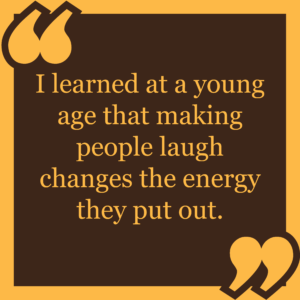 people I work with now are extremely liberal. My needle moved left a long time ago, but there is part of me that will always feel a little loyal to my original tribe and because of that I often feel isolated somewhere in between the left and the right. We all need to talk more. There has to be less us/them.
people I work with now are extremely liberal. My needle moved left a long time ago, but there is part of me that will always feel a little loyal to my original tribe and because of that I often feel isolated somewhere in between the left and the right. We all need to talk more. There has to be less us/them.
TrunkSpace: You started to make a serious push towards a writing career at age 30 by leaving your job and focusing on the craft full-time. What advice would you give to aspiring writers at similar places in their life who question if the move is the right one to make?
Quick: Don’t listen to people who offer writing advice. Half joking here. Some of the best advice I got was from non-writers. I’m not sure anyone can advise you on becoming the writer you need to be on the page. But being professional and realistic, making good business decisions, being smart about money because money is what buys you time to write, these types of things you can learn from others. Maybe how to survive as a creative type. Perhaps the best advice I ever received came over a breakfast beer in the Peruvian jungle. Painter Francisco Grippa said, “Be a professional, not an asshole.”
TrunkSpace: Had you started to pursue writing in a full-time capacity 10 years earlier, do you think it would have put you on a different creative path in terms of your voice as a writer?
Quick: In some ways I did start my writing career at twenty. I was writing back then, albeit unpaid. Reading. Taking creative writing classes. Justin Cronin was my teacher. But I hadn’t lived enough yet. I had to fumble through my twenties. Gain life experience.
TrunkSpace: Regarding the process, is writing a labor of love for you or does it feel more like labor? Do you enjoy the process?
Quick: Depends on the day. There are days when it feels like I’m not even writing, but channeling some divine voice. That sounds ridiculous, I realize, but we’ve all been high on our own words, even if it’s delusional. And there have been many more days when I stare at the screen for hours doing nothing but thinking, My career is over.
TrunkSpace: And what does that process look like? What are the ideal conditions for putting in a good day of writing?
Quick: Well, this will sound pretty uncool, I realize. But at the ripe old age of forty-three, eating healthy, getting good sleep, prioritizing my mental health, exercising (especially running, I try to do 30-40 miles a week these days), and limiting alcohol and caffeine intake – these things have become increasingly important. In my early thirties I drank coffee all day and sipped alcohol all night and wrote in alternating fits of anxiety and depression. It worked for a short while, but that sort of living would probably kill me now. It was a shitty way to function. I’m a lot happier these days.
TrunkSpace: Do you self-edit as you write?
Quick: Yes.
TrunkSpace: Where are you the hardest on yourself as a writer?
Quick: I seem to be in a deadlocked battle with imposter syndrome.
TrunkSpace: What are you working on now and what will people be able to read next?
Quick: A few screenplays for The Weinstein Company. Can’t really talk much about these projects right now, but I’m really excited about each. I will be writing another novel at some point, but not this year.
“The Reason You’re Alive” is available now from Harper.


